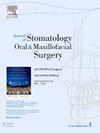构建虚拟气道模型,辅助咽后皮瓣手术矫正咽喉发育不全。
IF 1.8
3区 医学
Q2 DENTISTRY, ORAL SURGERY & MEDICINE
Journal of Stomatology Oral and Maxillofacial Surgery
Pub Date : 2024-09-30
DOI:10.1016/j.jormas.2024.102099
引用次数: 0
摘要
手术目的咽后皮瓣(PPF)是矫正咽发育不全(VPI)最常用的手术技术之一,在手术过程中,控制咽侧口的大小是手术效果的关键。材料与方法:2022 年 6 月至 2023 年 8 月,收集了 40 例腭裂修复患者。所有患者均被诊断为 VPI,并接受了改良 PPF 手术治疗。为每位患者重建上气道模型,并设计 PPF 虚拟气道模型。测量了鼻瓣膜面积,因为鼻瓣膜被认为是上气道最狭窄的部分。通过计算流体动力学分析预测了不同尺寸 LPP 的上气道阻力。通过咽侧孔大小对上气道阻力的影响,计算出在不明显增加上气道阻力的情况下每个咽侧孔的最小尺寸。术后随访 6-18 个月,包括言语效果和呼吸效果。根据头颅侧位片测量并比较静息软腭长度(RVL)、软腭有效工作长度(EWL)和软腭抬高角度(AVL):结果:阈值与鼻瓣之间存在线性关系(R=0.62)。在 40 例患者中,鼻瓣的平均大小为 47.81 平方毫米,LPP 临界值的平均大小为 31.63 平方毫米。术后鼻咽闭合成功率为 95%。与术前测量结果相比,RVL、EWL 和 AVL 均明显增加(P0.05):结论:在计算机流体动力学分析的帮助下,可以在不明显增加上气道阻力的情况下预测咽侧孔的阈值大小,降低 PPF 手术患者发生气道阻塞的风险。本文章由计算机程序翻译,如有差异,请以英文原文为准。
Construction of virtual airway model to assist surgical correction of velopharyngeal insufficiency with posterior pharyngeal flap
Objective
Posterior pharyngeal flap (PPF) is one of the most common surgical technique to correct velopharyngeal insufficiency(VPI), during which controlling the sizes of the lateral pharyngeal ports(LPP) is the key to outcomes. One innovative procedure was developed to well control the size of LPP.
Materials and methods
40 patients with repaired cleft palate were collected from June 2022 to August 2023. All patients were diagnosed with VPI, and treated with modified PPF surgery. For each patient, upper airway model was reconstructed, and the virtual airway model of PPF was designed. The nasal valve area was measured as it was considered to be the narrowest part of the upper airway. The upper airway resistances under different sizes of LPP was predicted through computational fluid dynamics analysis. The minimum size of each lateral pharyngeal port without obviously increase of upper airway resistance was calculated through effect of lateral pharyngeal ports’ size on upper airway resistance. Postoperative follow-up was 6–18 months, including speech outcome and respiration outcome. Resting soft palate length (RVL), effective working length of soft palate (EWL) and angle of soft palate elevation (AVL) were measured and compared according to the lateral cephalometric radiograph.
Results
There was a linear relationship between the threshold value and nasal valve (R = 0.62). Among the forty patients, the average size of nasal valve was 47.81 mm2, the average size of the threshold value of LPP was 31.63mm2. The proportion of velopharyngeal closure competence after surgery was 95 %. Compared with the preoperative measurements, there were significantly increase of RVL, EWL and AVL (P < 0.05). There were significantly difference in the nasal obstruction symptom evaluation score in long-term follow-up compared to short-term follow-up (P < 0.05), and no one needed flap revision. There was no significant difference in nasal respiration and nasal resistance before and after surgery (P > 0.05).
Conclusion
With the help of computer fluid dynamics analysis, it is possible to predict the threshold size of lateral pharyngeal port without obviously increasing upper airway resistance and reduce the risk of suffering from airway obstruction for patients undergoing PPF surgery.
求助全文
通过发布文献求助,成功后即可免费获取论文全文。
去求助
来源期刊

Journal of Stomatology Oral and Maxillofacial Surgery
Surgery, Dentistry, Oral Surgery and Medicine, Otorhinolaryngology and Facial Plastic Surgery
CiteScore
2.30
自引率
9.10%
发文量
0
审稿时长
23 days
 求助内容:
求助内容: 应助结果提醒方式:
应助结果提醒方式:


